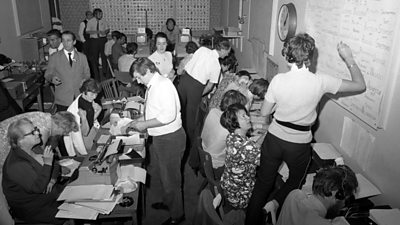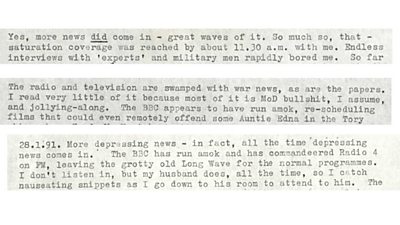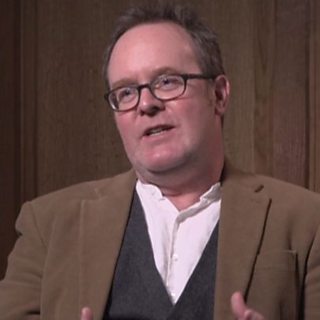Before the 1960s, the typical ����ý radio programme would have had its own name and identity – Woman’s Hour, Saturday Night Theatre, Daily Service, and so on. It would have been scripted, rehearsed, perhaps pre-recorded – and would almost certainly have begun and ended at a fixed and predictable time in the schedule.
The new DJs of Radio 1 offered something radically different: a flow of short, fairly interchangeable slices of radio each around three minutes long - pop songs, a bit of chat, quizzes, weather forecasts, phone-calls to listeners, and so on - all live and seemingly spontaneous. Its style seemed to match the spontaneity and informality of the era. And if ‘streaming’ pop seemed to be the future for music networks in 1967, it was easy to imagine how something similar could be achieved in the area of news: a kind of ‘rolling’ service, mostly live and able to respond quickly to unfolding events – in other words, the kind of service which had already proved a success at attracting listeners to radio stations across the USA.
But where in the ����ý’s family of networks might such a service be created? For many journalists, the most obvious answer was Radio 4, the former Home Service. It was a rich mix of drama, comedy, panel shows, documentaries, conversation, even the odd record show or concert. Yet news and current affairs was the biggest single part of its output. Might this ‘spine’ of news be slowly expanded, and eventually take over altogether?

No-one yet was seriously considering such a radical overhaul. But news programmes had already begun a slow – but significant - revolution of their own. One of the first steps taken, even while the Home Service was still alive, had been to challenge some seriously out-dated thinking inside the Corporation’s newsrooms and production offices - as the ����ý’s newly-released oral history interview with Gerard Mansell shows.
Before arriving at Broadcasting House in 1965, Mansell had been rising up the ranks of the ����ý’s Overseas Service. Half-French, educated in Paris, a former student of Chelsea School of Art, he had a cosmopolitan outlook. And, as a part-outsider, a firm desire to put his “foot on the accelerator” of change:
Here, then, was a Chief of the Home Service who wanted to bring a looser, livelier, brisker and more topical feel to the whole of his network. But if the out-dated focus on the evenings were to end, the most critical task was to bring greater attention to daytimes – and especially to radio’s new ‘peak time’, the morning.
In fact, a series of important changes were already underway at the Home’s own ‘breakfast show’. The person with overall responsible for Today at the time was Stephen Bonarjee. Back in 1963 he’d inherited a low-key programme with a presenter, Jack de Manio - a Bentley-driving habitué of the clubs of St James with a rich gin-and-tonic voice – presiding over a motley miscellany of items: “eccentric octogenarians, prize pumpkins, and folk who ate lightbulbs and spiders”, according to one slightly tongue-in-cheek description. Bonarjee’s first instinct was to include more ‘hard news’ – though, for now, only within strict limits…
Yet the pace of change quickened. Increasingly, Bonarjee wanted Today to be sharper, harder, and more youthful in its appeal.
In 1967, he asked producers for more items on fashion or sport to make the programme “more interesting to younger working class people living in the regions”. The following year, he introduced a new shift-pattern so that more up-to-date stories could be broken each morning…
Today’s embrace of a night-shift was an early foretaste of 24-hour coverage and the faster ‘news cycles’ that would come with it. For now, though, as Bonarjee acknowledged, on Today news had to co-exist alongside other human-interest items – just as on Radio 4 as a whole news programmes had to live alongside the “rich mix” of drama, comedy, short-stories and the rest.
Over the next three decades, there would be several attempts by senior ����ý journalists and managers to radically expand the amount of news on air, and even turn Radio 4 into an ‘all news’ network. But quite apart from the destruction this would entail to other programme genres, there was also the opinion of the audience to take into account.
When, in 1991, Radio 4 used its FM frequency to provide continuous coverage of the Gulf War in Iraq, there were plenty of regular Radio 4 listeners who were distinctly unhappy.
Here, three snippets from just one person’s listening diary from January that year, held in the Mass Observation archives, are typical. (More extracts from this archive are available in the section on ‘Listening to Radio’)
"Yes, more news did come in - great waves of it. So much so, that - saturation coverage was reached by about 11.30 a.m. with me. Endless interviews with 'experts' and military men rapidly bored me."
"The radio and television are swamped with war news, as are the papers. I read very little of it because most of it is MoD bullshit, I assume, and jollying-along. The ����ý appears to have run amok, re-scheduling films that could even remotely offend some Auntie Edna..."
"28.01.91. More depressing news - in fact, all the time depressing news comes in. The ����ý has run amok and has commandeered Radio 4 on FM, leaving the grotty old Long Wave for the normal programmes. I don't listen in, but my husband does, all the time, so I catch nauseating snippets as I go down to his room to attend to him."

Most ����ý licence-payers wanted news. But very few, it seemed, showed signs of wanting endless amounts of it.
And that’s a pattern which almost certainly holds true today. It’s one of the reasons why the idea of ‘rolling news’ radio, something entirely unleavened by other fare, such as sport, drama, or debate – something which looked highly likely at the end of the 1960s – has never actually fully materialised on the ����ý.
-
����ý Oral History Collection

